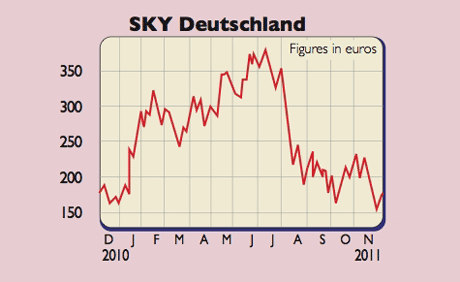
Sky Deutschland (DE: SKYD), rated a BUY by DZ Bank
It may be the festive season, but families are battening down the hatches. They are dining out less and spending more time and money entertaining themselves at home. That’s good news for satellite broadcaster BSkyB. Its customers are spending more and more each year on upgrading their home entertainment packages through services such as Sky Go, HD, 3D and Anytime.
Here, I want to focus on BSkyB’s cousin, Sky Deutschland (SKYD). This firm was initially floated in 2005 for €28 a share under its original name of Premiere. But soon after it lost the rights to show live football and subscriber churn (the rate of customer turnover) ballooned. In January 2008, James Murdoch bought a 15% stake at around €9 per share and shortly afterwards restored live German Bundesliga football games to the small screen. However, he discovered that Premiere had fewer customers than he had expected, and the stock duly sank to €1.50. Since then News Corp has rebranded the company, installed new management and upped its stake to 49.9% by injecting fresh capital.
Sceptics claim that Murdoch is throwing good money after bad. But it’s worth remembering that his father faced the same accusation when he was turning around BSkyB 20 years ago.
There’s plenty of room for sales growth
Sky Deutschland’s latest results are encouraging. All four key metrics – net subscriber growth, average revenue per user (ARPU), churn and sales – were positive. That’s down to improvements in the product, which now offers all the bells and whistles subscribers expect. Chief executive Brian Sullivan is betting that he can break years of German reticence about pay TV with offerings including live sport, films and 3D content. While retention rates are almost as high in Germany as in Britain, overall customer numbers are far lower. BSkyB boasts 10.4 million clients, each generating ARPU of €52 per month.
By contrast, Sky Deutschland’s subscriber base is 2.9 million, with ARPU of €30.94. So the opportunity to close the gap is huge. Sure, Germany already has a wide selection of free-to-air stations (such as ARD, ZDF, RTL and ORF), but BSkyB managed to assert itself against 100 free TV services in Britain. And while Sullivan concedes that “Germans are less impulsive than Britons”, he adds that “once they’re on board, they’ll stay”.
He also believes that Germans simply don’t do ‘cheap’. “Look at people’s cars and kitchens. They have no problem with buying quality if they think it’s worth it.” He also points out that six million households have previously signed up with Sky Deutschland. “The service delivery let them down, but we’ve fixed that… The real question is: will they give us a second chance?” I think they will, and not just because BSkyB overcame similar glitches in Britain in the 1990s. There are 41 million households in Germany and Austria. Of these, 22 million already have high-definition TVs, yet they have very few programmes to watch. While 56% of British households have pay TV, German penetration rates are under 13%.
The stock could have much further to go
BSkyB is worth around £13.5bn now and generates £6.6bn in turnover. Assuming the same adoption rates are achieved in Germany as in Britain, in ten years’ time Sky Deutschland may hit a top-line sales figure of €10bn per year. In the short term, analysts are predicting revenues of €1.1bn and €1.3bn for this year and next. After that EBITDA should turn positive. I value the group on a 2.5 times sales multiple. Adjusting for €495m of net debt, that delivers an intrinsic value of €3 a share.
The risk is that Sky Deutschland may overpay for the 2013 Bundesliga rights, particularly as Sullivan also wants to bid for the online and mobile channels, which are currently held by Deutsche Telekom. “We want to be able to broadcast football on smartphones and tablet PCs.” Indeed, should the cost of this type of content continue to rise as it has done in Britain, there is a remote danger that the group may need to raise more money. Although it’s likely that the banks will remain supportive, they could demand that fresh equity is raised to support the balance sheet. Also, if the eurozone were to implode, unemployment would jump and advertising income would decline. That could hit performance hard.
But the firm is already in a strong position as the leader in paid-for sports, films and high-definition content. It also has a blueprint strategy to copy from BSkyB. With a future takeover by News Corp by no means out of the question, Sky Deutschland seems a decent bet for long-term investors with a tolerance for some risk. DZ Bank has a price target of €3.46.
Rating: SPECULATIVE BUY at €1.70.
• Paul Hill also writes a weekly share-tipping newsletter, Precision Guided Investments. See
www.moneyweek.com/PGI
, or phone 020-7633 3634.